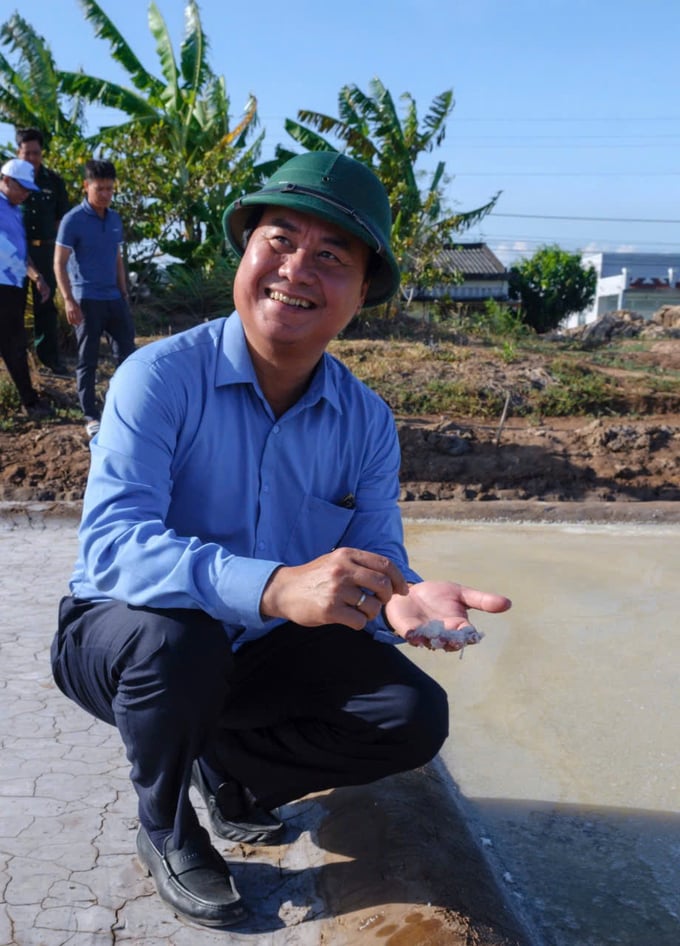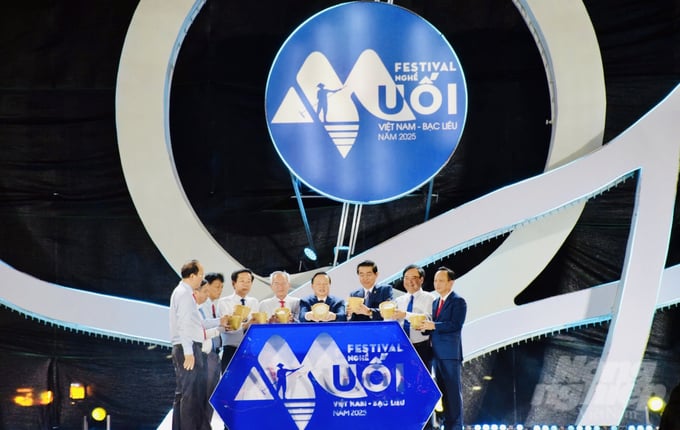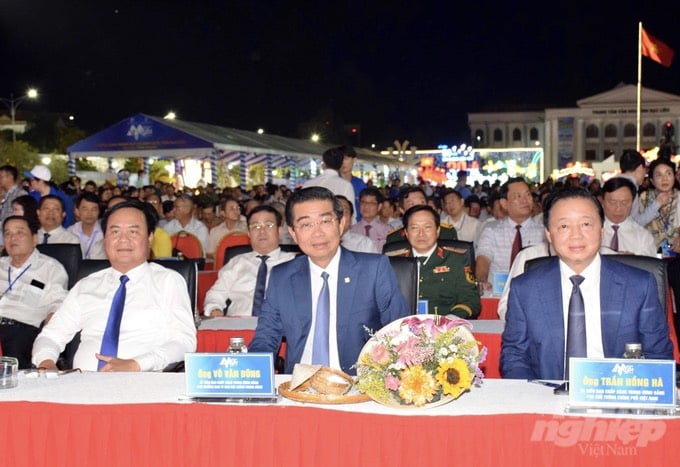November 27, 2025 | 02:43 GMT +7
November 27, 2025 | 02:43 GMT +7
Hotline: 0913.378.918
November 27, 2025 | 02:43 GMT +7
Hotline: 0913.378.918
Salt has been a fundamental seasoning for generations, and it has also been a product that has been crystallized from the hard labor of salt farmers and the natural world. Not only do the extensive white salt fields in Bac Lieu, Ninh Thuan, Binh Thuan, Nam Dinh, and other coastal provinces provide salt for daily use, but they also exhibit the distinctive cultural values of seaside communities.
Nevertheless, the salt industry in Vietnam is currently dealing with significant obstacles. The livelihoods of salt farmers are becoming more precarious, market demand is inconsistent, and the price of salt remains unstable. Imported salt, notably low-cost industrial salt, is subject to competitive pressure. Affecting production, climate change is modifying natural conditions, while the industry faces challenges in achieving sustainable development due to the absence of robust support mechanisms.

Deputy Minister of Agriculture and Environment Vo Van Hung visits salt fields in Bac Lieu province. Photo: Trong Linh.
In order to guarantee the livelihoods of salt farmers and increase the value of Vietnamese salt, it is essential to develop the salt industry through a multi-value approach that integrates production innovation, the preservation of traditional crafts, and the implementation of comprehensive support policies.
Initially, there must be a change in perspective toward a multi-value development strategy. The industry must shift its focus from the production of basic salt to higher-value products that align with the current market.
Second, it is imperative to diversify salt products. Numerous businesses and municipalities have initiated experiments with specialty salt models, which have generated increased value. These include refined salt, industrial salt for food processing, medical, and chemical industries, mineral and medicinal salts for health care, saunas, and salt therapy, and organic and specialty salts designed for premium and export markets.

Deputy Prime Minister Tran Hong Ha (fourth from right), Deputy Minister of Agriculture and Environment Vo Van Hung (second from right) at the Vietnam Salt Festival - Bac Lieu 2025. Photo: Trong Linh.
Third, it is imperative to integrate salt production with experiential tourism in order to increase value, thereby providing novel perspectives on salt-related products. In numerous countries, including Japan, South Korea, and Thailand, salt tourism has fostered the sustainable growth of the industry by attracting tourists who wish to observe traditional salt-making processes.
Vietnam has significant potential to implement this model in its renowned salt-producing regions due to its existing advantages. In spite of this, it is crucial to acknowledge that such an undertaking is not feasible via immediate action. Several prerequisites must be satisfied, such as the establishment of salt experience zones, the integration of salt production with local culture and village history, the development of tourism-related products such as salt-based foods, souvenirs, and spa services, and the investment in tourism infrastructure. This combination would not only enhance income but also contribute to the preservation of Vietnam's salt-making tradition.
In recent years, the salt industry in Vietnam and other countries have demonstrated the necessity of robust policies for the sustainable development of this sector. Furthermore, in order to assist salt farmers in adapting to emerging trends and achieving long-term stability, it is essential to establish a comprehensive policy framework that prioritizes environmental protection, technical assistance, and credit.

Deputy Prime Minister Tran Hong Ha (right cover), Deputy Head of the Central Internal Affairs Commission Vo Van Dung (center); Deputy Minister of Agriculture and Environment Vo Van Hung attend the Vietnam Salt Festival - Bac Lieu 2025. Photo: Trong Linh.
Initially, it is necessary to establish credit policies that prioritize salt farmers and salt enterprises. The absence of capital to invest in industrial salt processing and clean salt production technology is one of the most significant obstacles faced by salt farmers. Currently, they require access to low-interest loan programs in order to enhance salt fields and modernize production systems. Businesses that process salt should also receive financial assistance to facilitate the development of value-added products. In addition, the salt industry must establish a risk insurance fund to maintain production during price fluctuations or natural disasters. The implementation of these policies will increase the confidence of salt farmers in making production investments, thereby enhancing product quality and productivity.
Secondly, technical assistance and market expansion policies—also known as "technical extension for salt production"—are essential in addition to credit support. These policies should not only offer financial assistance, but also assist salt farmers in accessing new technology, enhancing their abilities, and stabilizing their market. Transferring clean salt and organic salt production technologies to enhance the value of the product, training salt farmers to meet international standards for export opportunities, and establishing stable purchasing systems between enterprises and salt farmers to mitigate price exploitation are among the specific measures.
In actuality, certain provinces, such as Bac Lieu and Ninh Thuan, have implemented salt cooperative models as a pilot program. This initiative has facilitated the establishment of a consistent market and the substantial increase in the income of salt farmers.
Ultimately, the most critical requirements of salt farmers are climate change adaptation measures and environmental protection policies. Rising sea levels, saline intrusion, and evolving hydrological conditions have all had a significant impact on the salt industry.
In order to alleviate these effects, it is imperative to implement a variety of measures. These include the development of intelligent seawater channel systems to prevent water pollution in salt production, the adoption of environmentally friendly salt production models to reduce greenhouse gas emissions, and the protection and expansion of coastal mangrove forests as a natural barrier against the rise in sea levels.
In recent years, Bac Lieu and Ca Mau in Vietnam have successfully implemented certain ecological salt production models in conjunction with mangrove conservation. These models have produced favorable outcomes, simultaneously safeguarding the environment and establishing a sustainable livelihood for salt farmers.
The protection, sustainable development, and integration of salt with contemporary economic values are essential for its true brilliance. Combining science, culture, and sustainable support policies is not the only way to increase the value of Vietnamese salt; it also involves enhancing productivity. Only then can Vietnamese salt rise to new heights.
To achieve this, it is necessary for the government, enterprises, and salt farmers to work in close collaboration with clearly defined objectives. Vietnam's salt industry can not only guarantee stable livelihoods for salt farmers but also expand into international markets by implementing synchronized solutions, thereby solidifying its position on the global salt map.
Four key factors to elevate the salt industry
First, developing a multi-value salt industry, from table salt to industrial salt, medicinal salt, and salt tourism.
Secondly, the implementation of preferential credit policies to assist salt farmers and enterprises in investing in the industry's growth.
Third, the establishment of a structured technical support system to guarantee that salt farmers have access to a stable market, technology, and knowledge.
Fourth, sustainable development necessitates safeguarding the environment during salt production and confronting climate change challenges.
Translated by Linh Linh

(VAN) The Mekong River Commission adopts the 2026 - 2030 Strategic Plan with a people-centered approach.
/2025/11/26/1720-1-200855_132.jpg)
(VAN) Viet Nam and Japan have many conditions to expand cooperation on climate change adaptation, particularly in disaster risk management based on advanced technologies.

(VAN) The strong development of digital technology and artificial intelligence is opening up opportunities to transform science and technology into a 'Magic eye' for disaster forecasting and early warning.

Applying vaccines and proactive disease prevention helps pig herds stay healthy, maintain productivity, reduce risks, and decrease reliance on antibiotics in modern livestock farming.

(VAN) Many advanced agricultural technologies and products were shared at the Viet Nam - South Korea Agricultural Technology Introduction, Trade Promotion, and Connection Seminar 2025.

(VAN) Minister Tran Duc Thang hopes to strengthen connections and exchanges with China in agriculture and environment sector through the Embassy of Vietnam in Beijing.

(VAN) After 50 years of strategic cooperation, Viet Nam and UNICEF remain committed to promoting fair and inclusive development for all children in the digital future.